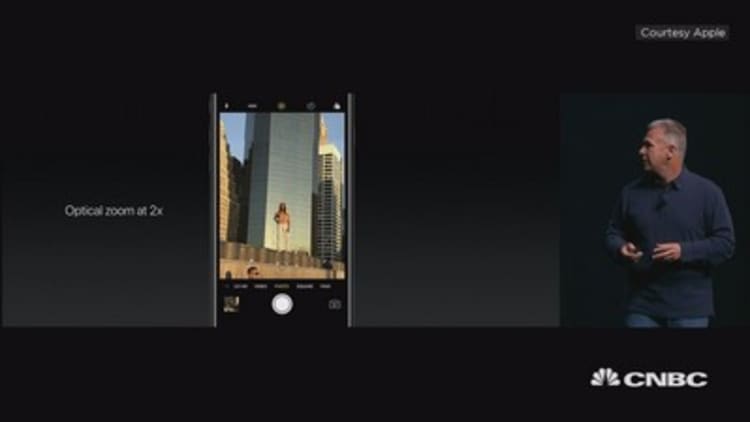
Apple's newest iPhone could have the makings of a cutting-edge virtual reality device — an innovation that could buck critics of the company's fall lineup.
The phone's camera lays the groundwork to let users capture content with more depth, exactly the kind of technology that could lend itself to user-generated virtual reality (VR) content, writes Ben Thompson of technology blog Stratechery:
What Apple didn't say was that they are releasing the first mass-market virtual reality camera. The same principles that make artificial bokeh possible also go into making imagery for virtual reality headsets. Of course you probably won't be able to use the iPhone 7 Plus camera in this way — Apple hasn't released a headset, for one —but when and if they do the ecosystem will already have been primed, and you can bet FaceTime VR will be be an iPhone seller.
The new iPhone 7 camera, debuted on Wednesday, gives users the ability to zoom further into images, and a new "portrait" software mode creates the shallow depth of field or bokeh (where a subject is in focus against a blurred background) that was previously a hallmark feature of high-end digital single-lens reflex (DSLR) cameras.
As predicted, the Plus also has two rear 12-megapixel cameras — one with a wide angle lens and one with a telephoto lens. A new chip uses machine learning to detect objects and set exposure, focus, cinema-standard color and white balance within 25 milliseconds — 60 percent faster than before.
"iOS uses a framework called Metal to maximize graphics performance," Apple's iPhone 7 description reads. "Whether you're surfing the web, moving from app to app, or playing the most complex 3D video game, the graphics and responsiveness are amazingly smooth."
Apple did not immediately respond to a request for comment about its virtual reality ambitions. But the theory of mass-market virtual reality lends credence to CEO Tim Cook's comments that virtual reality is not a "niche" technology.
"We expect that Apple will add incremental features to the iPhone over the next few years that will [enable] advances in augmented reality delivery through the [device]," Apple analyst Gene Munster of Piper Jaffray wrote ahead of the iPhone 7's release. "More specifically, this could include additional camera features to pull in image based information and additional sensors to enable new interactions with the real world. AR enhancements on the iPhone could also come through enhanced software."
It comes less than a year after Apple hired a top virtual reality researcher and acquired virtual and augmented reality start-up Flyby Media — which provided the image-recognition software for the three-dimensional maps created on smartphones for Google's Project Tango.
Such a move might also quiet fears raised by industry watchers that soft moves into content — think the recent introduction of "Pokemon Go" on Apple Watch and new "Super Mario" game — aren't making a paradigm-shifting splash.
To be sure, Apple would undoubtedly brush up against competition in a virtual reality play, including from its direct hardware rival, Samsung, and software rival, Google.
Though Apple has "dual-domain" pixels for wide-viewing angles, Samsung's premium handsets already have OLED displays, which are brighter, higher resolution and curved on the edges — which keeps Apple from being effective in VR, writes The Wall Street Journal's Geoffrey Fowler. Plus, Samsung already has the Gear VR headset.
Google, meanwhile, has tried a more mainstream, low-cost approach with Google Cardboard, and recently opened Daydream, a virtual reality development platform for Android phones. Then, of course, there's Facebook's Oculus.
Few of those approaches, though, are in everyone's pocket. An iPhone can be.
Apple's strategy on virtual reality would be markedly different than Google's experimental approach, said Horace Dediu, an expert in disruptive technology who spoke to UBS earlier this year. He said he expects Apple to wait until virtual reality offers a clear-use case and better experience, in keeping with the high standards the company must meet to maintain a "premium" brand.
"Apple is definitely going to play in these areas because they understand better than anyone how to attach a technology brand to an emotional and visceral feel," Dediu said in a UBS research note. "Hitting home runs and nothing else was the metaphor that [Apple co-founder Steve] Jobs used. ... Behind the scenes Apple is working on everything. They're just not releasing it or talking about it."


